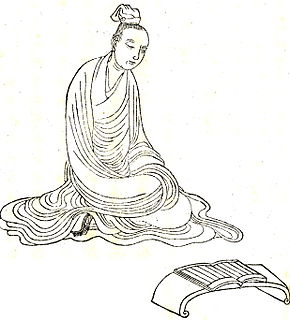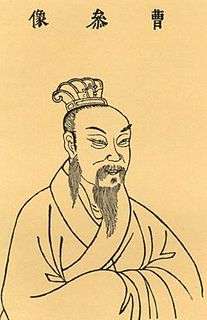Related Research Articles

Emperor Gaozu of Han, born Liu Bang with courtesy name Ji (季), was the founder and first emperor of the Han dynasty, reigning from 202 – 195 BCE. His temple name was "Taizu" while his posthumous name was Emperor Gao, or Gaodi; "Gaozu of Han", derived from the Records of the Grand Historian, is the common way of referring to this sovereign even though he was not accorded the temple name "Gaozu", which literally means "High Founder".

Zhang Liang, courtesy name Zifang, was a strategist and statesman who lived in the early Western Han dynasty. He is also known as one of the "Three Heroes of the early Han dynasty" (漢初三傑), along with Han Xin (韓信) and Xiao He. Zhang Liang contributed greatly to the establishment of the Han dynasty. After his death, he was honoured with the posthumous title "Marquis Wencheng" by Emperor Qianshao.

The Chu–Han Contention was an interregnum period between the Qin dynasty and the Han dynasty in Chinese history. Following the collapse of the Qin dynasty in 206 BC, Xiang Yu split the former Qin Empire into the Eighteen Kingdoms. Civil wars soon broke out in a struggle for supremacy, with two major contending powers emerging, namely the Kingdom of Western Chu led by Xiang Yu, and the Kingdom of Han led by Liu Bang. Several minor kings also warred, but these were largely insignificant compared to the main conflict between Western Chu and Han. The war ended in 202 BC with total victory for Han at the Battle of Gaixia, with Liu Bang soon crowning himself as the first emperor of the Han dynasty.

Xiang Yu, born Xiang Ji (項籍), was the Ba Wang (霸王) or Hegemon-King of Western Chu during the Chu–Han Contention period of China. A noble of the Chu state, Xiang Yu rebelled against the Qin dynasty and became a prominent warlord. He was granted the title of "Duke of Lu" (魯公) by King Huai II of the restoring Chu state in 208 BC. The following year, he led the Chu forces to victory at the Battle of Julu against the Qin armies led by Zhang Han. After the fall of Qin, Xiang Yu was enthroned as the "Hegemon-King of Western Chu" (西楚霸王) and ruled a vast area covering modern-day central and eastern China, with Pengcheng as his capital. He engaged Liu Bang, the founding emperor of the Han dynasty, in a long struggle for power, known as the Chu–Han Contention, which concluded with his eventual defeat at the Battle of Gaixia. He committed suicide at the bank of the Wu River.
Zhang Han was a military general of the Qin dynasty. When uprisings erupted throughout China during the reign of Qin Er Shi, Zhang Han led the Qin armies and successfully quelled several of these rebel forces. In 207 BC, Zhang Han was defeated by Xiang Yu of Chu at the Battle of Julu, after which he surrendered along with his 200,000 troops. He was conferred the title "King of Yong" (雍王) by Xiang Yu and given part of the lands in Guanzhong as his fief when Xiang split the former Qin Empire into the Eighteen Kingdoms after the fall of the Qin dynasty. Zhang Han's territory was conquered by Liu Bang in 206 BC, and he committed suicide a year later.

Chu was a Zhou dynasty vassal state. Their first ruler was King Wu of Chu in the early 8th century BCE. The Chu was located in the south of the Zhou dynasty and lasted during the Spring and Autumn period. At the end of the Warring States period it was destroyed by the Qin in 223 BCE during the Qin's wars of unification.

Han Xin was a military general who served Liu Bang during the Chu–Han Contention and contributed greatly to the founding of the Han dynasty. Han Xin was named as one of the "Three Heroes of the early Han dynasty", along with Zhang Liang and Xiao He.
Emperor Yi of Chu, also known as King Huai II of Chu before receiving his de jure emperor title, personal name Xiong Xin, was the ruler of the Chu state in the late Qin dynasty. He was a grandson of King Huai of Chu. In 223 BC, during the Warring States period, the Chu state was conquered by the Qin state, which unified the various Chinese feudal states in a series of wars and established the Qin dynasty in 221 BC. In 209 BC, when rebellions broke out throughout China to overthrow the Qin dynasty, the Chu state was revived as an insurgent state against Qin imperial rule. Xiong Xin was discovered by Xiang Liang, a rebel leader who descended from a famous Chu general, Xiang Yan, and installed on the Chu throne as "King Huai II of Chu". However, Xiong Xin was merely a puppet ruler because power was concentrated in Xiang Liang's hands, and was later passed on to Xiang Liang's nephew, Xiang Yu, after Xiang Liang was killed in battle. In 206 BC, the Qin dynasty was overthrown by the rebels, after which Xiang Yu, who was the de facto leader of all the rebel forces, divided the former Qin Empire into the Eighteen Kingdoms. He promoted King Huai II to a more "honourable" title – Emperor Yi of Chu – and made him the nominal sovereign ruler over all the Eighteen Kingdoms. Xiang Yu then had Emperor Yi relocated to Chen County and secretly ordered Ying Bu to assassinate the emperor during the journey.

The Feast at Swan Goose Gate, also known as the Banquet at Hongmen, Hongmen Banquet, Hongmen Feast and other similar renditions, was a historical event that took place in 206 BC at Hong Gate outside Xianyang, the capital of the Qin dynasty. Its location in present-day China is roughly at Hongmenbao Village, Xinfeng Town, Lintong District, Xi'an, Shaanxi province. The main parties involved in the banquet were Liu Bang and Xiang Yu, two prominent leaders of insurgent forces who rebelled against the Qin dynasty from 209–206 BC.

The Battle of Julu was fought in Julu in 207 BC primarily between forces of the Qin dynasty and the insurgent state of Chu. The Qin commander was Zhang Han, while the Chu leader was Xiang Yu. The battle concluded with a decisive victory for the rebels over the larger Qin army. The battle marked the decline of Qin military power as the bulk of Qin's armies were destroyed in this battle.

Cao Shen or Cao Can, courtesy name Jingbo, was a chancellor of the Western Han dynasty. He participated in the Chu–Han Contention on Liu Bang 's side and contributed greatly to the founding of the Han dynasty.
Song Yi was a minister of the insurgent Chu kingdom during the final years of the Qin Dynasty.
The Three Rebellions in Shouchun were a series of revolts that occurred in the state of Cao Wei during the Three Kingdoms period. The rebellions broke out in the later years of Wei when the Sima clan, headed by Sima Yi, usurped state power. The military governors of Shouchun rose in revolt thrice in the name of a rebellion to oust the Sima clan from power. The respective leaders of the three rebellions were Wang Ling, Guanqiu Jian and Wen Qin, and Zhuge Dan. All the revolts were eventually suppressed.

Fan Zeng was an adviser to the warlord Xiang Yu, who fought for supremacy with Liu Bang, the founder of the Han dynasty, during the Chu–Han Contention.
Zhongli Mo was a military general who served the warlord Xiang Yu during the Chu–Han Contention, a power struggle between Xiang Yu and Liu Bang, the founder of the Han dynasty. His name is sometimes incorrectly written and pronounced as "Zhongli Mei".
Long Ju was a military general who served under the warlord Xiang Yu during the Chu–Han Contention.
Xiang Chan, courtesy name Bo, better known as Xiang Bo, was a noble of the Chu state of the Seven Warring States. He was an uncle of the warlord Xiang Yu, who competed with Liu Bang, the founder of the Han dynasty, for supremacy over China in the Chu–Han Contention.
Gong Ao was a ruler of the Kingdom of Linjiang of the Eighteen Kingdoms during the Chu–Han Contention, an interregnum between the Qin Dynasty and the Han Dynasty.
Ying Bu was a warlord and vassal king who lived in the early Han dynasty. He was a native of Lu County. In his early life under the Qin dynasty, Ying Bu was convicted and sentenced to qing, so he was also called Qing Bu (黥布). He was then sent to Mount Li to perform hard labour by constructing Qin Shi Huang's mausoleum. He later escaped with some men and became the leader of a bandit gang. Ying Bu participated in the insurrection against the Qin dynasty after the Dazexiang Uprising broke out in 209 BC. After the uprising failed, he became part of a rebel force led by Xiang Liang. He assisted Xiang Liang's nephew and successor Xiang Yu in overthrowing the Qin dynasty. After the fall of Qin, he initially fought on Xiang Yu's side in the Chu–Han Contention, a power struggle for supremacy over China between Xiang Yu and Liu Bang. However, later, he defected to Liu Bang's side and helped Liu defeat Xiang Yu and become the emperor. During this period of time, Ying Bu held the title "King of Jiujiang". After Liu Bang established the Han dynasty in 202 BC, he appointed Ying Bu as a vassal king and granted him the title "King of Huainan". In 195 BC, Ying Bu rebelled against the Han dynasty but was defeated and killed.
Kuaiji Commandery, formerly romanized as K‘uai-chi Commandery, was a former commandery of China in the area of Hangzhou Bay. When first established, its capital was at Wu, which became known as "Kuaiji" from this role. The initial territory ran from the south bank of the Yangtze through most of modern Zhejiang to an indeterminate border among the free people of Minyue. Wu and Wuxing commanderies were later formed between the Yangtze and the north shore of Hangzhou Bay; the administration of the remainder of Kuaiji Commandery was then removed to the site of the former Yue capital in modern Shaoxing's Yuecheng District, which also became known as Kuaiji from this role. By the Tang, Hangzhou was also separated and Kuaiji ran from a little north of the Zhe River in the west to Ningbo in the east.